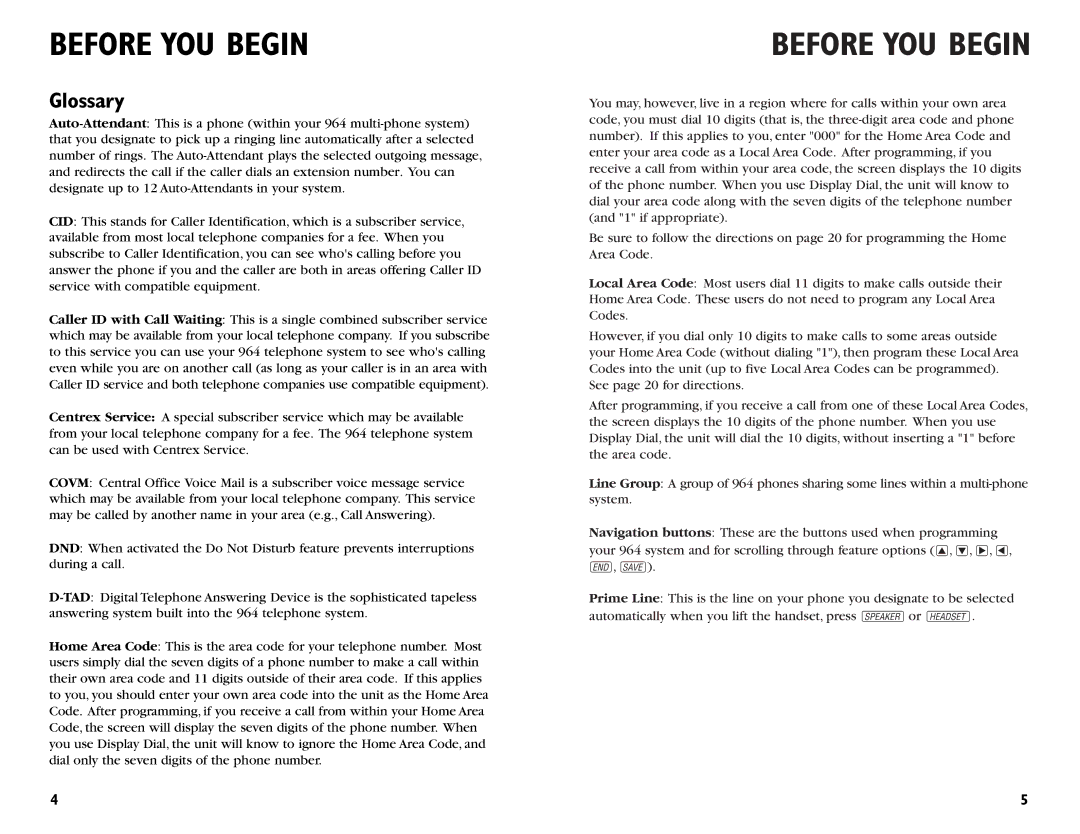BEFORE YOU BEGIN
Glossary
CID: This stands for Caller Identification, which is a subscriber service, available from most local telephone companies for a fee. When you subscribe to Caller Identification, you can see who's calling before you answer the phone if you and the caller are both in areas offering Caller ID service with compatible equipment.
Caller ID with Call Waiting: This is a single combined subscriber service which may be available from your local telephone company. If you subscribe to this service you can use your 964 telephone system to see who's calling even while you are on another call (as long as your caller is in an area with Caller ID service and both telephone companies use compatible equipment).
Centrex Service: A special subscriber service which may be available from your local telephone company for a fee. The 964 telephone system can be used with Centrex Service.
COVM: Central Office Voice Mail is a subscriber voice message service which may be available from your local telephone company. This service may be called by another name in your area (e.g., Call Answering).
DND: When activated the Do Not Disturb feature prevents interruptions during a call.
Home Area Code: This is the area code for your telephone number. Most users simply dial the seven digits of a phone number to make a call within their own area code and 11 digits outside of their area code. If this applies to you, you should enter your own area code into the unit as the Home Area Code. After programming, if you receive a call from within your Home Area Code, the screen will display the seven digits of the phone number. When you use Display Dial, the unit will know to ignore the Home Area Code, and dial only the seven digits of the phone number.
BEFORE YOU BEGIN
You may, however, live in a region where for calls within your own area code, you must dial 10 digits (that is, the
Be sure to follow the directions on page 20 for programming the Home Area Code.
Local Area Code: Most users dial 11 digits to make calls outside their Home Area Code. These users do not need to program any Local Area Codes.
However, if you dial only 10 digits to make calls to some areas outside your Home Area Code (without dialing "1"), then program these Local Area Codes into the unit (up to five Local Area Codes can be programmed). See page 20 for directions.
After programming, if you receive a call from one of these Local Area Codes, the screen displays the 10 digits of the phone number. When you use Display Dial, the unit will dial the 10 digits, without inserting a "1" before the area code.
Line Group: A group of 964 phones sharing some lines within a
Navigation buttons: These are the buttons used when programming your 964 system and for scrolling through feature options (+,
E, S).
Prime Line: This is the line on your phone you designate to be selected automatically when you lift the handset, press Kor h.
4 | 5 |
